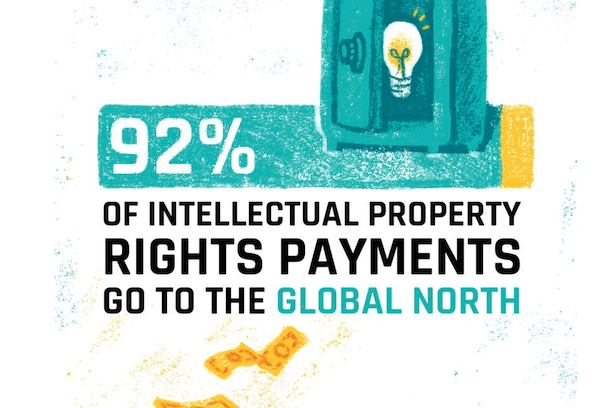Dear friends,
Greetings from the desk of Tricontinental: Institute for Social Research.
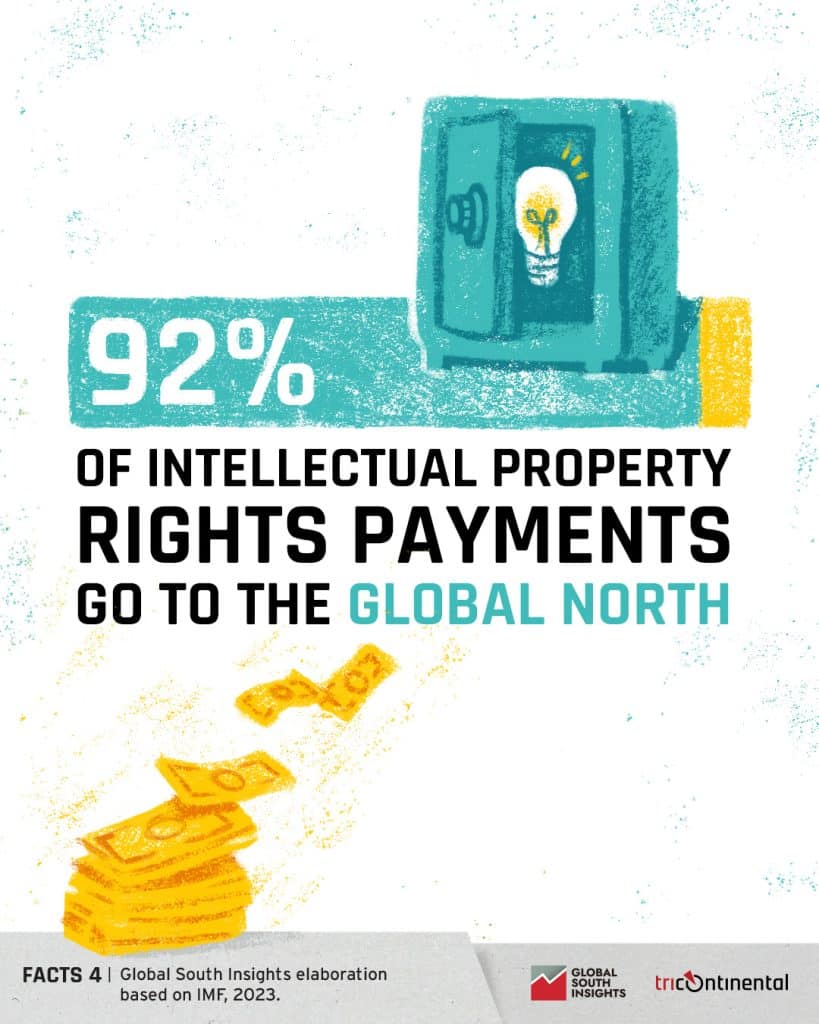
The number in the graph above, based on data from the International Monetary Fund, is not an exaggeration. Despite the growing technological and industrial capacity of countries in the Global South, countries and corporations in the Global North continue to own intellectual property patents on key products, locking the South into indefinite patent payment regimes. These include patent payments for pharmaceuticals, digital technologies (such as licensing fees for software and telecommunications infrastructure), and agricultural goods (such as genetically modified seeds, fertilisers, pesticides, and equipment). Scientific and technological advances have indeed accelerated in the Global South, with several countries—particularly in Asia—developing sophisticated high-speed rail, green technologies, and telecommunications infrastructure. Yet even in these sectors, most countries continue to pay large rents to Global North firms that own patents on key components.
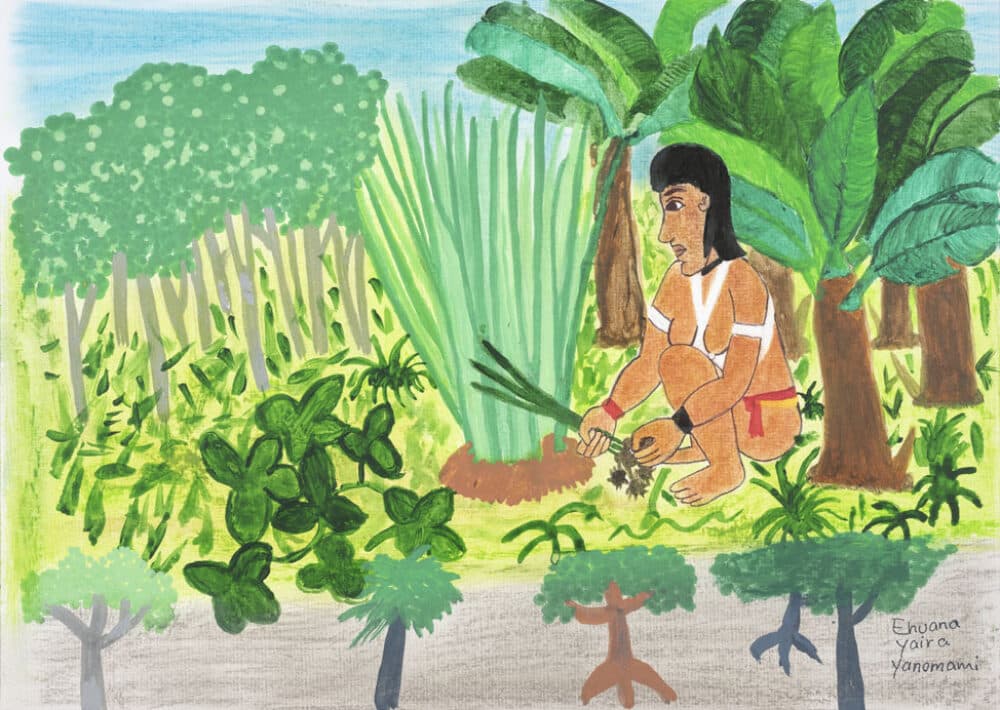
Ehuana Yaíra (Yanomami Indigenous Territory, Brazil), We Women Have a Plant Called Oka Xikɨ, Which Can Weaken Men When They Become Aggressive, 2023.
There are five sectors where the imbalance in patent-related payments is most severe (in other words, where Global South countries pay significantly more in royalties and licensing fees than they receive in return):
- Pharmaceuticals. Drug patents are largely owned by firms based in Europe, Japan, and the United States. A recent example of the high price of access to essential medical technologies was the cost of importing mRNA vaccines during the COVID-19 pandemic. Several countries in the Global South, such as South Africa and India, faced delays and inflated costs in vaccine procurement due to patent restrictions and limited technology transfer. (South Africa eventually opted to purchase vaccines from India’s generic producers—such as Cipla and the Serum Institute—which saved the country approximately $133 million over three years.)
- Information and Communication Technologies (ICT). Every component of ICTs—from software and hardware to semiconductors and mobile networks—costs Global South countries a king’s ransom. This is not only because of the price of the physical products themselves, but also because of the high licensing fees for the underlying technologies, which are often controlled by exclusive patent pools (consortia of firms that jointly manage and license essential patents).
- Industrial machinery and manufacturing technologies. Patents for essential Computer Numerical Control (CNC) machines (automated tools used in precision manufacturing) along with robotics and other precision equipment (all of which are crucial in the automotive, mining, and textile sectors) are largely owned by Global North firms. As a result, Global South countries seeking to industrialise are forced to import these technologies and pay ongoing licensing fees rather than develop or produce them domestically.
- Agricultural biotechnology. A handful of companies—such as DuPont, Monsanto (Bayer), and Syngenta—control key agricultural biotechnologies, including fertilisers, genetically modified seeds, and pesticides, all of which are distributed through costly licensing agreements. This monopoly control not only limits the ability of Global South farmers to access or develop alternatives—increasing dependence on foreign firms and inflating production costs—but also undermines seed sovereignty and contributes to environmental degradation through monoculture farming, overuse of chemical products, and biodiversity loss.
- Green technology. Key innovations in battery systems, solar panels, and wind turbines are protected by patents held largely by Global North firms, making technology transfer impossible. As a result, Global South countries must pay exorbitant licensing fees to adopt these technologies, limiting their ability to develop sustainable energy systems independently.
These disparities are largely due to Global North firms’ monopolistic control of innovations and intellectual property regimes, which prevent Global South countries from building competitive alternatives. The lack of Research and Development (R&D) capacity in medium and small Global South economies plays an enormous role in reproducing these disparities.
This lack of R&D capacity is rooted in a colonial legacy that has left many Global South countries with underdeveloped educational institutions, particularly in the advanced sciences. It is further compounded by the neocolonial migration pattern that sees talented students leave for the Global North in search of career opportunities. Finally, Global South states have failed to build the political leverage needed to challenge international intellectual property regimes that preserve the advantages gained by the Global North countries and firms in earlier eras.
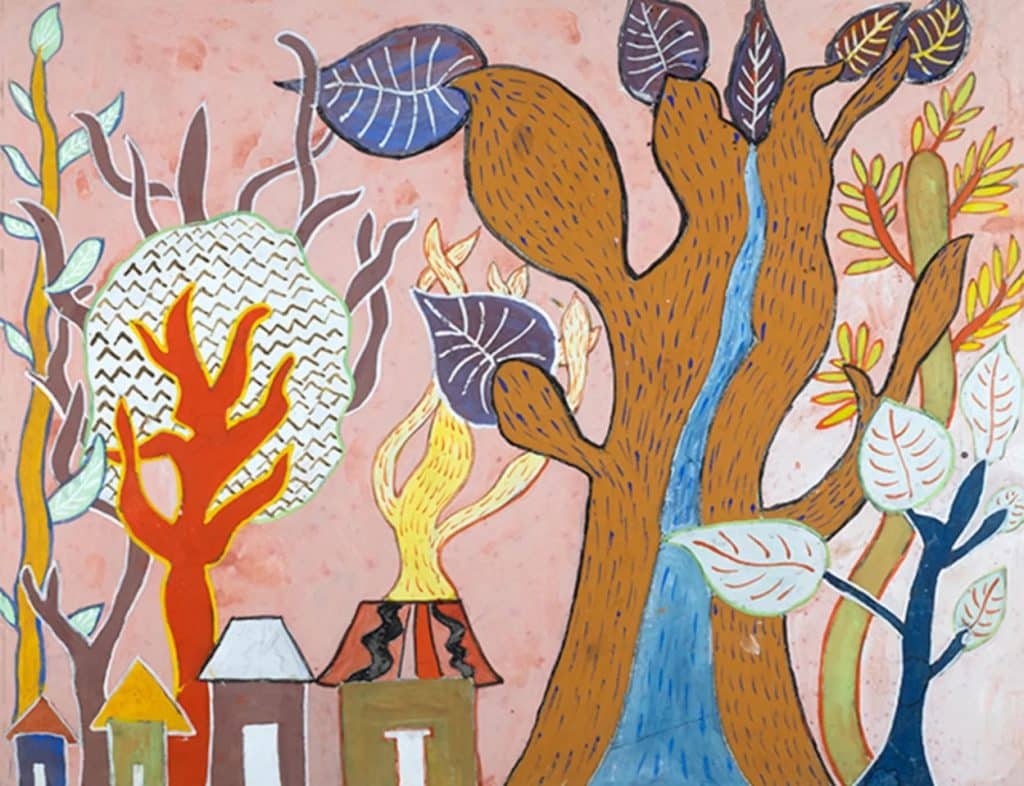
Moses Johuma (Zimbabwe), Untitled, n.d.
In 1986, the Global North—led by the United States—initiated the Eighth Round of the General Agreement on Trade and Tariffs (GATT), also known as the Uruguay Round. The previous seven rounds of the GATT had focused primarily on tariff reduction among the Atlantic states and Japan, with little involvement from the formerly colonised world. But the Uruguay Round shifted the agenda: in exchange for access to Northern markets, Southern states were pressured to break down barriers to Northern investment, technology, and services and to revise their intellectual property laws. During this period, Northern monopoly firms’ comparative advantages in intellectual property rights and the service sector emerged as enormously profitable.
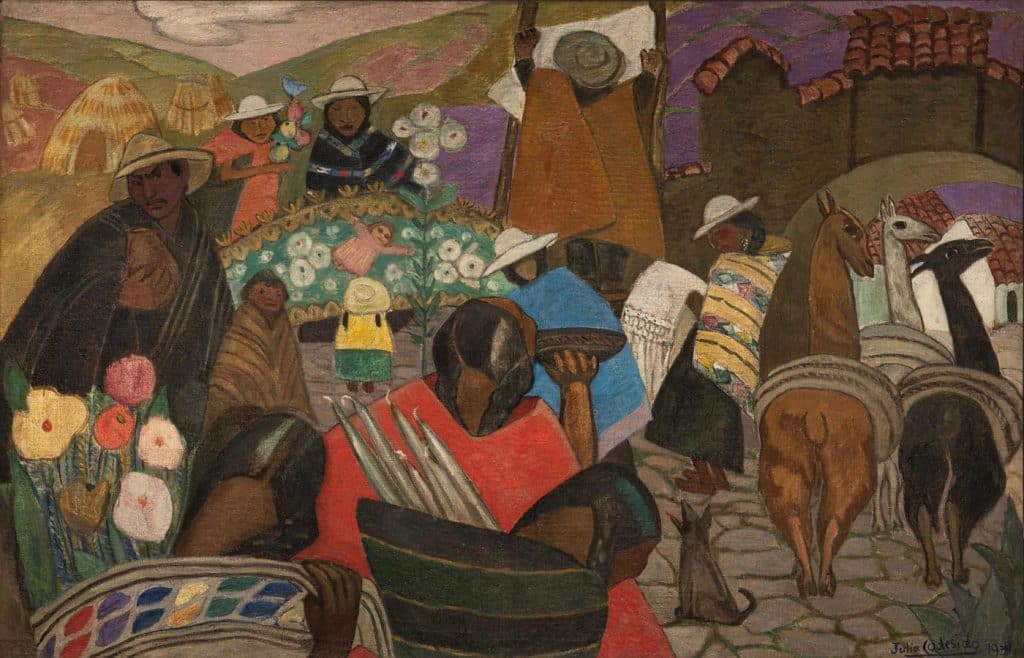
Julia Codesido (Peru), Mercado indígena (Indigenous Market), 1931.
Importantly, the drafts for the Uruguay Round negotiations came not from the countries that sat at the table but from mysterious groups such as the Intellectual Property Coalition and the Multilateral Trade Negotiations Coalition. As it turned out, these coalitions were not made up of countries, but of the lobbying groups of key Global North monopoly firms such as DuPont, Monsanto, and Pfizer, which pushed to revise the concept of intellectual property. Prior to the Uruguay Round, patents could only be taken out on the process by which an innovation was developed, allowing other individuals, firms, and countries to achieve the same end result through a different method and enabling reverse-engineered innovations. The Uruguay Round changed this principle by asserting that the final product itself should be patentable, thereby granting rents to the patent holder regardless of the process used to achieve the end product. This would become known as the Agreement on Trade-Related Aspects of Intellectual Property Rights or TRIPS Agreement.
Ten Global South countries (Argentina, Brazil, Cuba, Egypt, India, Nicaragua, Nigeria, Peru, Tanzania, and Yugoslavia), led by Brazil and India, began meeting to discuss the dangers of the Uruguay Round. This Group of Ten (G10) argued that the new approach would lead to technological starvation in the Global South, with minimal technology transfer except at a high cost and a virtual collapse of domestic technological development. For a while it appeared as if the G10 might win some concessions, but the United States applied pressure, and the group began to fracture. By 1989, Brazil and India conceded, and the group dissolved.
The debate then began to focus on disagreements between the United States and the European Union over agricultural subsidies. When the Uruguay Round was completed in 1994, the Global South accepted the new, fatal intellectual property regime and the rules that followed from it. The TRIPS Agreement became the heart of the World Trade Organisation (WTO), which was established the following year.
Nine years later, India, Brazil, and South Africa formed a bloc called IBSA, which called for waivers on intellectual property rights and compulsory licensing for essential medicines—especially antiretroviral drugs for HIV/AIDS. Their efforts contributed to the WTO’s 30 August 2003 decision to temporarily relax certain TRIPS Agreement obligations, allowing countries without manufacturing capacity to import generic medicines under compulsory licenses. While this did not reverse the underlying logic of the TRIPS Agreement (also known as the TRIPS principle), it did secure limited relief for certain drugs. (The 2003 pledge by the Gates and Clinton Foundations to reduce the cost of HIV/AIDS drugs, on the other hand, was a smokescreen to protect the broader TRIPS framework.) This early alignment between Brazil, India, and South Africa eventually grew into the BRICS bloc in 2009 following the onset of the Atlantic world’s Third Great Depression in 2007. Although BRICS has launched important initiatives in health and technology, it has not been able to undermine the TRIPS principle.
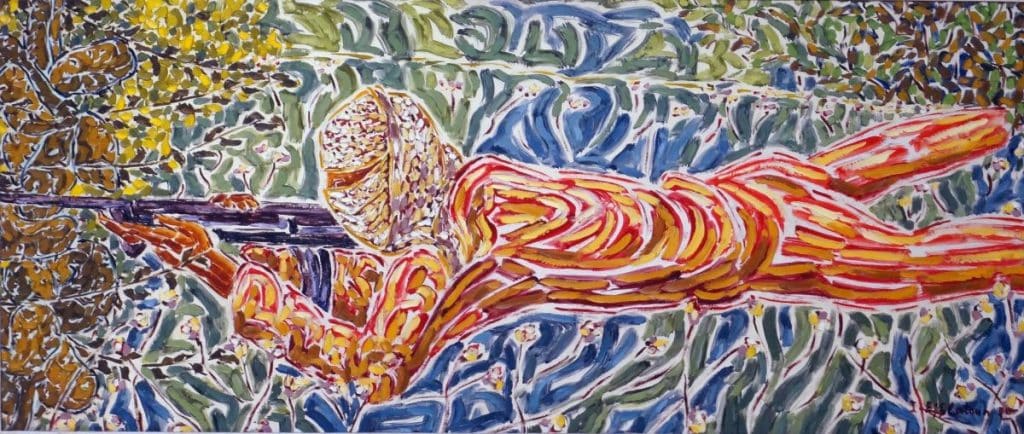
Injy Aflatoun (Egypt), Fedayeen (Soldier), 1970.
During the 1980s, Global South governments began to raise the issue of what would later be called biopiracy. What they argued was that many so-called modern innovations—particularly in agriculture and pharmaceuticals—had their origin in traditional knowledge systems developed by farmers and healers in Africa, Asia, and Latin America. The argument made little headway in general, although in a few landmark cases—such as W. R. Grace’s attempt to patent the neem leaf from southern Asia and Phytopharm’s attempt to develop the hoodia, traditionally used by the San people of southern Africa—the accusation of biopiracy forced the firms to either surrender their patents or share their profits. The debate around biopiracy led to a World Intellectual Property Organisation (WIPO) treaty that required firms to disclose the origin of the genetic resources and traditional knowledge used in their products. However, this treaty is frequently undermined in practice. Apart from underscoring that this kind of disclosure did not happen in the past, it has delivered no substantial benefit either to indigenous communities or the countries where they live. In fact, the TRIPS Agreement overrides WIPO provisions, granting firms significant latitude in how they exploit traditional knowledge.
Thinking of biopiracy and intellectual property rules over the dissemination of green technology takes me to the world of the Mexican poet and former ambassador Homero Aridjis, whose Selva Ardiendo (The Jungle Aflame) might be a good warning against the rules that suffocate the world:
The saffron skies resemble tropical Turners.
The dancing palms are kissed by voracious tongues.
The howler monkeys leap from crest to crest.
Through the billows of smoke, companies of parrots
with singed tails go searching for the sun
that watches them covertly, like a putrid eye.
Warmly,
Vijay

